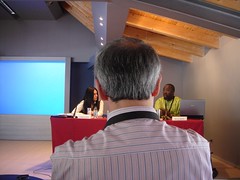Having spent three days in the sunny Pyrenees talking about the importance of intercultural dialogue, I felt like my political scientist identity was raising its (ugly) head. I felt like we should more often go back to the basics of politics when talking about intercultural dialogue. With this I mean things like:
1. POWER: Who needs intercultural dialogue? Is it the immigrant, the scared native, both or is it a smokescreen for the bigger streams in contemporary politics?
We should remember that all relationships in the society are loaded with power and influence. For instance we can look at the phrase mentioned often around intercultural dialogue: tolerance. Even if people using the phrase often mean well, we should keep in mind that tolerance is a power structure where one party decides to tolerate the other and can on any given moment opt out of it.
2. MONEY: Who benefits financially from intercultural dialogue? What is the economic justification for it? Is intercultural dialogue about using all the talent in the labour market or about harvesting the savings of immigrants into local banks?
3. GENDER: Very often it seems like the only position left for immigrant women in intercultural dialogue is the one of a helpless victim waiting for the white (male) saviour.
4. POLITICS: A truly political intercultural dialogue requires a problem to be solved, different view points and a decision-making process. In order for people to join and get excited, they need to be able to link it to their daily realities. Too often intercultural dialogue is presented as a non-frictious process, which turns it easily into a non-term and it ends up being castrated from all of its political sides. No sane person would be against intercultural dialogue as a notion. If politics is seen as turning people’s individual concerns to the agenda of our society, intercultural dialogue by definition should be political and frictious.
5. COMMUNITY: Community is one of the buzz words of today’s politics. One often hears terms such as Muslim community, Turkish community, gay community or the black community without proper critique whether these groups see themselves as communities, whether they have legitimately elected representatives and whether politics or dialogue can be based on these groups in a world of fluid, plural identity. This leads me well to my favourite notion.
6. INDIVIDUAL: The phrase itself – intercultural dialogue – is paradoxical as cultures cannot talk to each other. Dialogue is a process between people. Intercultural dialogue should start more often from an individual and the individual’s self-definition, not from static notions such as a community or culture. I cannot know how someone’s identity is structured but most of us are able to explain our own position.
Subscribe to:
Post Comments (Atom)













No comments:
Post a Comment